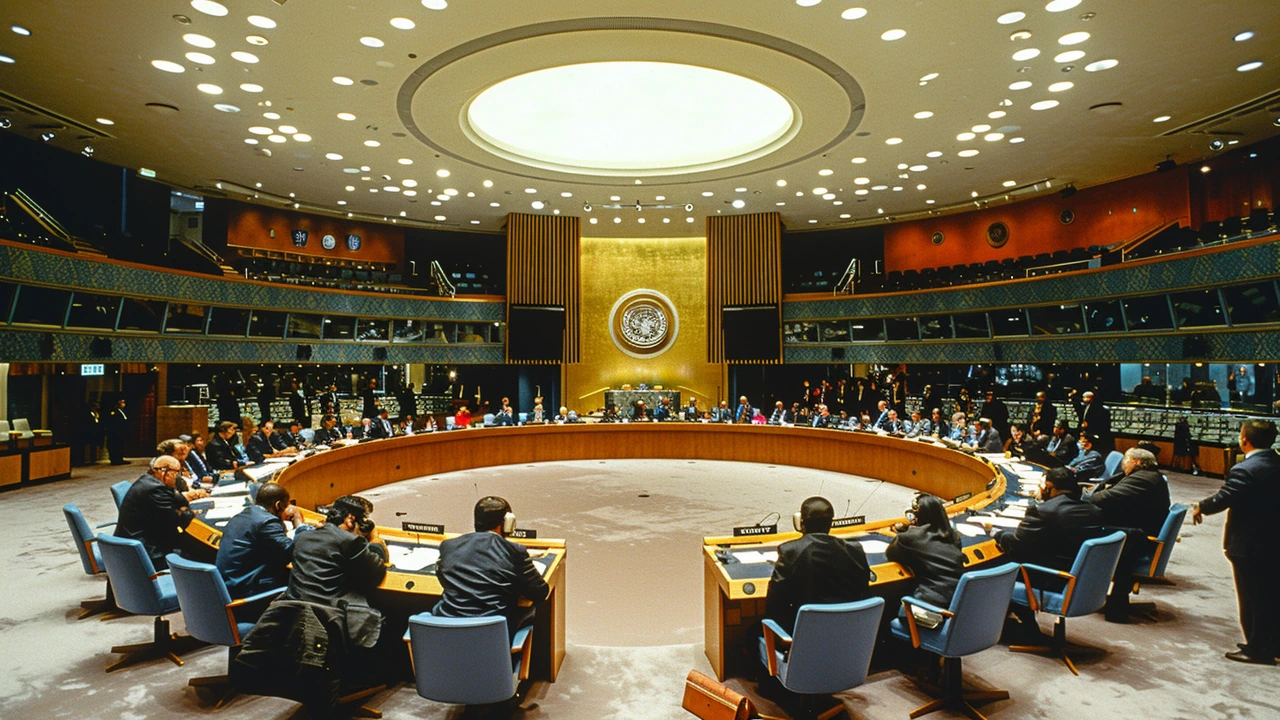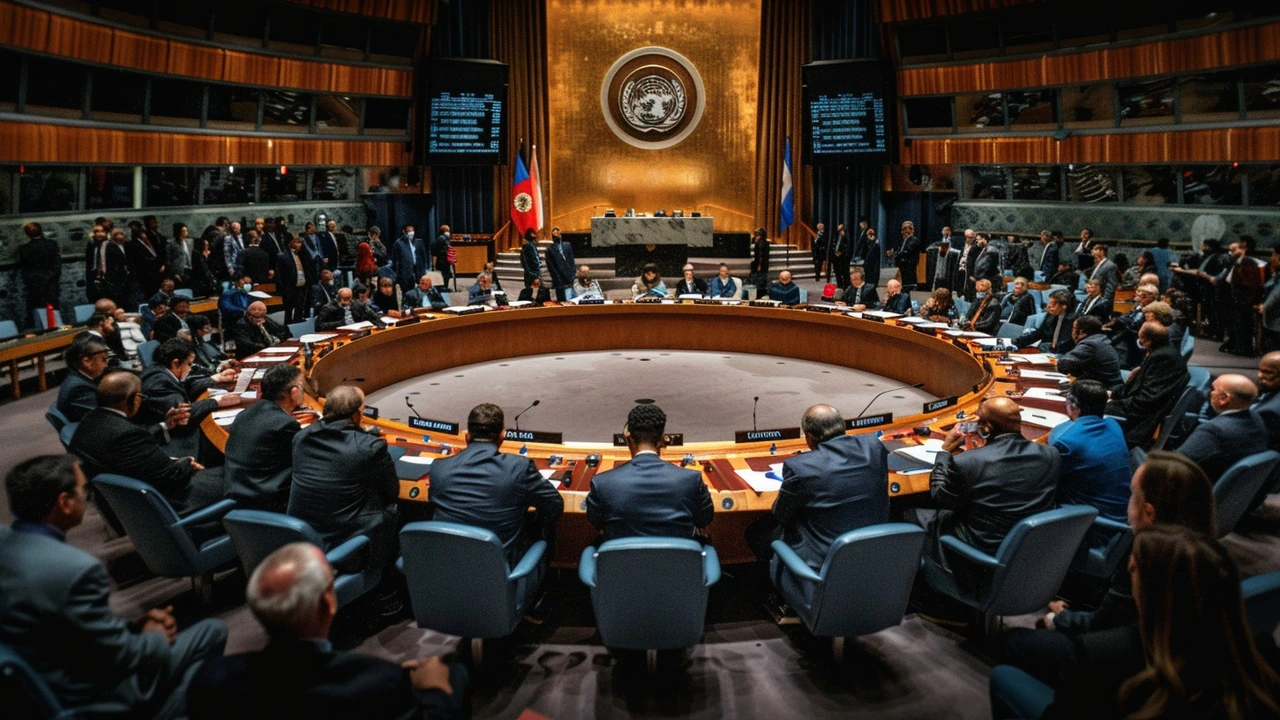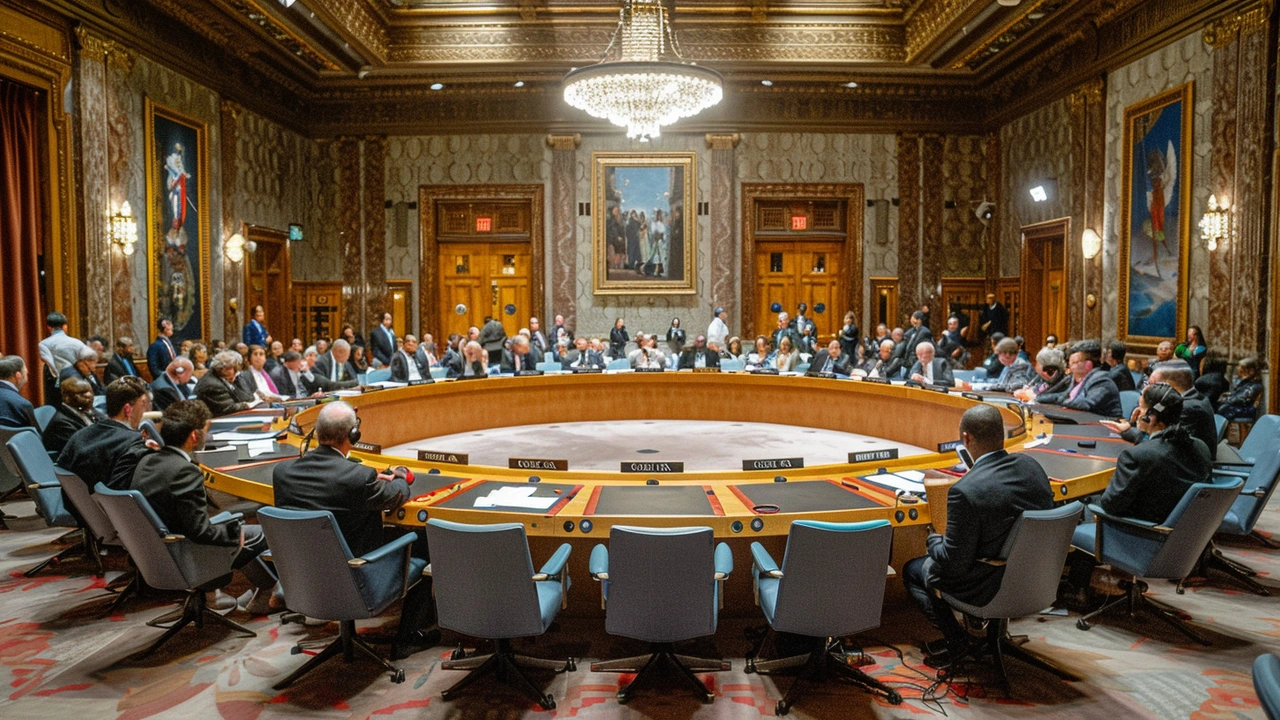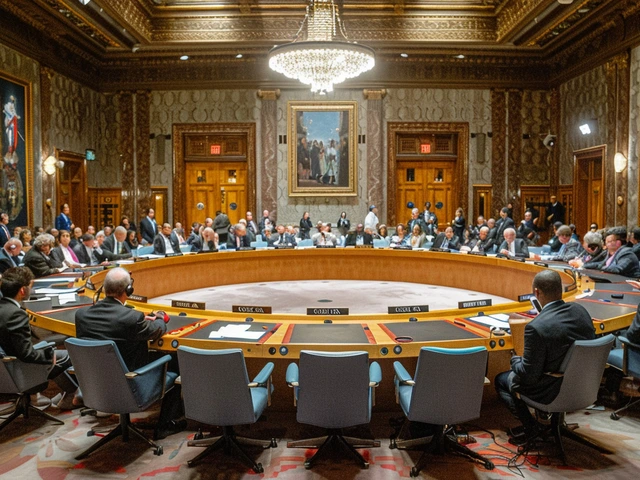UN Security Council Convenes Over Deadly Israeli Airstrikes in Rafah
The United Nations Security Council assembled urgently to discuss the horrific events in Rafah, where an Israeli airstrike killed 45 Palestinians and caused injuries to over 200 individuals, many of whom were seeking refuge in a camp. This tragic event has stirred the international community and led to condemnation from various high-profile leaders and organizations.
Martin Griffiths, the UN humanitarian chief, did not mince words when he labeled the attack as “utterly unacceptable.” His criticism extended towards Israeli Prime Minister Benjamin Netanyahu, who had referred to the devastating event as a “tragic mistake.” Griffiths’ strong statements reflect the growing frustration and astonishment at the violence affecting thousands of innocent lives. The refugee camp, already a place of desperation, has been engulfed in chaos following this airstrike.
Global Reactions
The criticism did not stop with Griffiths. Volker Turk, the UN high commissioner for human rights, and Charles Michel, President of the European Council, also expressed their profound indignation at the strikes. These attacks, which have ignited fires in makeshift tents and scattered hope, are seen as an egregious violation of human rights and moral responsibility.
The Rafah strike is part of a larger and deeply troubling panorama of escalating conflict in the area. Triggered by a brutal and unexpected Hamas attack on Israel in October, which claimed 1,200 lives and resulted in roughly 250 hostages, the situation has rapidly deteriorated. According to reports from the Gaza health ministry, Israel's military response has been relentless, leading to the deaths of over 36,000 Palestinians, a number that includes both civilians and combatants. This tragic toll underscores the severity and human cost of the ongoing violence.
Suffering on the Ground
The UN agency for Palestinian refugees has painted a bleak picture of the current conditions in Gaza. Labeling it as “hell on earth,” the agency has emphasized the dire humanitarian crises unfolding, with the civilian population bearing the brunt of the suffering. The region, already strained under blockade and limited resources, is now facing unprecedented levels of hardship.
Beyond the physical destruction, the psychological toll on the affected populations cannot be understated. Families have been torn apart, communities shattered, and the sense of security and normalcy that once existed obliterated. The cycle of violence has perpetuated trauma and despair among the refugees who have already endured countless hardships.
The international community's response highlights a critical need for de-escalation, humanitarian aid, and a renewed commitment to peace. Diplomatic efforts are being urged, but the path forward remains fraught with challenges. With each passing day, the call for a ceasefire grows louder, yet the violence continues to exact a heavy toll.

A Call for International Intervention
For many around the world, the images and reports out of Rafah are a stark reminder of the urgent need for comprehensive international intervention. There is a growing consensus that the international community must step in to halt the violence and prioritize the protection of civilians. Critical voices have emphasized that without immediate action, the situation could spiral even further out of control.
Human Rights Watch and other advocacy groups are calling for independent investigations into the strikes and the broader conduct of the military operations. Such investigations are aimed at holding those responsible accountable and ensuring that similar incidents do not occur in the future.
Humanitarian Needs
As the conflict rages on, the need for humanitarian assistance has become even more urgent. Aid organizations are struggling to provide basic necessities such as food, medical supplies, and shelter to those displaced by the violence. The infrastructure in Gaza has been decimated, creating insurmountable challenges for aid delivery.
Doctors and medical staff are working under extreme conditions, often risking their own lives to save others. Hospitals are overwhelmed with casualties, and the shortage of essential medical supplies further complicates the dire situation. The resilience of the healthcare providers in Gaza is nothing short of heroic, but their efforts need substantial support from the global community.
Moreover, educational facilities have been destroyed, leaving a generation of children without access to schooling. The long-term impact of the conflict on education and future opportunities for these children is a growing concern among educators and aid workers. Providing safe spaces and continuing education in the midst of conflict are becoming increasingly challenging.

The Path to Peace
While diplomatic efforts continue behind closed doors, there is a palpable sense of urgency for a resolution to the conflict. Proposals for ceasefire agreements and peace talks have been tabled, but finding common ground remains elusive. Various stakeholders, including regional powerhouses and international organizations, are being called upon to facilitate meaningful dialogue between the warring parties.
The Israeli-Palestinian conflict has deep historical roots, and solving it requires addressing underlying causes and grievances that have festered for decades. Initiatives aimed at promoting mutual understanding and co-existence are critical in building a sustainable peace framework. The role of grassroots movements and local leaders in fostering reconciliation will be paramount in the post-conflict rebuilding process.
Future Prospects
The future of Gaza and its people hangs in the balance, with much depending on the actions taken by the international community. There is a pressing need to provide not just immediate relief, but also long-term support to rebuild the shattered infrastructure and restore hope to a beleaguered population.
Initiatives focusing on economic development, education, and healthcare will be fundamental in helping Gaza emerge from the shadows of conflict. Empowering local communities through skill-building and employment opportunities can pave the way for sustainable development and create a more stable and prosperous region.
As the world watches, the stories of those affected by the airstrikes in Rafah and the broader conflict remind us of our shared humanity and the importance of striving towards a future where peace and justice prevail. The international community must rise to the occasion, guided by compassion and a commitment to upholding human rights for all.



Comments
Totally heartbroken seeing Rafah shattered, it’s just unimaginable.
The UN’s whining is just an echo chamber for political point‑scoring. They parade moral outrage while the real victims stay buried under rubble. Their resolutions are hollow gestures that do nothing but delay accountability. If the council cared, they'd actually enforce something, not just pontificate.
From a humanitarian security perspective, the incident underscores a breach of international humanitarian law, necessitating an independent fact‑finding mission.
It’s painful to watch, but at least the world finally noticed 😔
We can still rally support for aid convoys and keep hope alive 🙌
While the immediate impulse is to celebrate any glimmer of solidarity, we must remember that the architecture of humanitarian response in Gaza is riddled with obstacles that extend beyond mere logistics. The blockade, imposed air, land and sea restrictions, and the scarcity of functional ports transform even the most well‑intentioned convoy into a protracted negotiation. Moreover, the disintegration of health infrastructure means that medical supplies are not just needed, they are lifesaving. Each truck that crosses the border must be coordinated with local clinics that are operating on backup generators, often with limited staff. The political calculus of donor nations also influences the timing and volume of aid, as any move is scrutinized for perceived bias. In addition, the psychological trauma inflicted on displaced families hampers the efficient distribution of resources, because basic needs are intertwined with mental health support. Community leaders, who are the first point of contact, are themselves under duress, navigating between security checkpoints and the ever‑shifting frontlines. Consequently, any aid effort demands a multifaceted strategy that integrates logistics, diplomacy, and psychosocial care. The international community has the capacity to mobilize both financial and technical expertise, yet it frequently stalls due to competing geopolitical interests. The UN’s role, while symbolic, can be operationalized through granting protected corridors and oversight mechanisms that assure both parties of neutrality. Civil society organizations on the ground have demonstrated remarkable resilience, adapting to the scarcity by improvising shelters from whatever materials remain. Their grassroots networks are indispensable for mapping the most urgent needs, which often are invisible to high‑level briefings. It is also essential to coordinate with the Palestinian Authority and local NGOs to avoid duplication of efforts that waste precious time. Importantly, sustained engagement, rather than episodic bursts of assistance, will build trust and facilitate a more effective response. Only through such comprehensive, long‑term commitment can we hope to alleviate the suffering that has become endemic in Rafah and the wider Gaza Strip.
One must appreciate the nuanced diplomatic choreography that underpins every UNSC resolution, even if it appears perfunctory to the untrained eye.
Indeed, the choreography is as much about power dynamics as it is about genuine concern for civilian protection.
People keep shouting about the numbers but forget the faces behind them
The narrative being fed to us is curated by interests that thrive on perpetual conflict, masking hidden agendas that profit from chaos.
Strategically, a multi‑layered approach encompassing conflict de‑escalation, humanitarian corridors, and post‑conflict reconstruction frameworks is imperative.
Let's keep pushing for ceasefire talks; every small step counts towards lasting peace.
The tragedy unfolding in Rafah is not merely a series of isolated incidents, but a manifestation of historical grievances that have festered across generations. When we examine the roots of the conflict, we uncover layers of displacement, broken promises, and competing national narratives that have never been reconciled. The human cost, quantified in numbers, becomes abstract unless we anchor it to the lived experiences of mothers who have lost children, fathers who have been torn from their livelihoods, and children whose futures are robbed of education. In this context, the international community's pronouncements, however well‑intentioned, risk becoming performative if they are not coupled with concrete mechanisms for accountability. The doctrine of responsibility to protect, though noble, requires robust implementation that transcends diplomatic platitudes. Moreover, the psychological scars inflicted by relentless bombardment contribute to a cycle of trauma that fuels further animosity and hinders any prospects for reconciliation. We must therefore prioritize psychosocial interventions alongside physical reconstruction, recognizing that rebuilding trust is as vital as rebuilding homes. The role of civil society cannot be overstated; grassroots initiatives that foster dialogue and mutual understanding serve as the bedrock for sustainable peace. Yet these initiatives are often underfunded, marginalized, or outright suppressed by parties who perceive them as threats to entrenched power structures. Funding agencies and donor states should thus calibrate their support to empower these local actors, ensuring that aid does not inadvertently reinforce the status quo. Simultaneously, transparent investigations into alleged war crimes must be pursued with vigor, to demonstrate that impunity is unacceptable. The legal frameworks at our disposal, from the Geneva Conventions to the International Criminal Court, provide avenues for justice, provided the political will exists to utilize them. In the interim, humanitarian corridors must be protected, with all belligerents respecting their inviolability, to allow essential supplies to reach those in desperate need. The global citizenry, informed by unfiltered reporting and personal testimonies, holds the power to demand accountability from their governments and international bodies. Ultimately, the path to peace is neither linear nor swift, but through collective resolve, informed advocacy, and unwavering empathy, we can steer the narrative away from endless bloodshed toward a horizon of hope.
The idealistic spiel sounds nice, but it ignores the brutal reality that power politics will always trump moral rhetoric.
Enough with the endless speeches, it’s time for real action and not just more talking points
While fervor is understandable, channeling that energy into coordinated relief efforts can make a tangible difference.
Hey folks 😊 let's keep the conversation constructive and focus on ways we can all help!
Constructive dialogue is essential; however, actionable strategies must be delineated clearly and executed promptly
Here’s a quick guide: support reputable NGOs, donate verified funds, and share reliable updates 🛠️